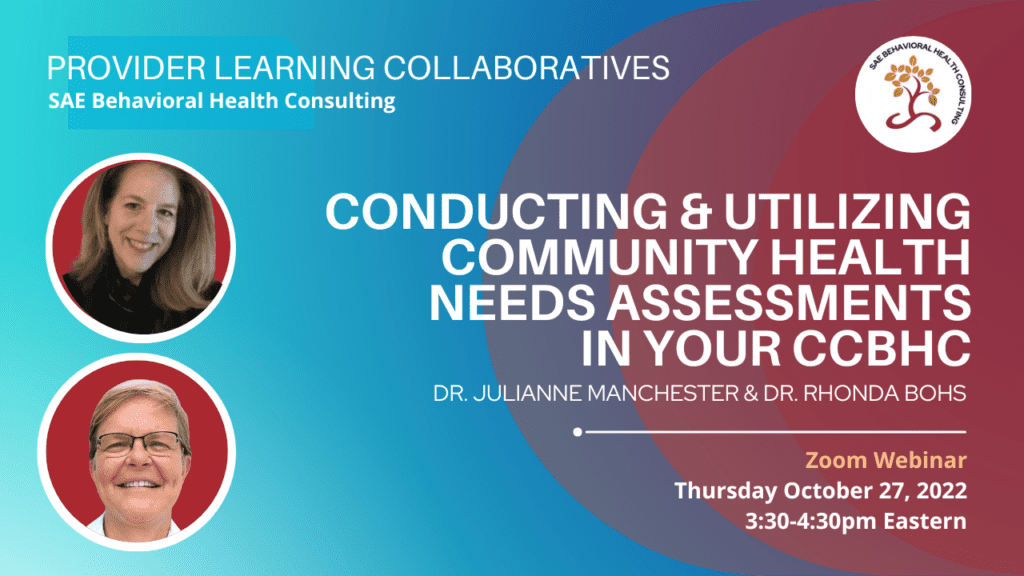
In addition to identifying priority health needs and aligning partners and resources to address community needs, CHNAs are a vital tool for informing population health management. Your CHNA will provide valuable data to direct resources toward high-risk populations, identify opportunities to enhance care delivery, inform patient engagement initiatives, and direct overall strategic planning.
In this webinar recording, SAE experts Dr. Julianne Manchester and Dr. Rhonda Bohs discuss ways to carry out a CHNA to bring more value to your community and your organization.
Learn how to use a CHNA to inform population health management initiatives and on the intersection between community health needs and care delivery.
Learning Objectives





This recording is available here.
BIOS
Rhonda Bohs, Ph.D., has over 25 years of experience in conducting research and program evaluation including serving as the lead evaluator for multiple SAMHSA-funded initiatives. Additionally, Dr. Bohs has served as Site Investigator for activities in the NIDA Clinical Trials Network and as Co-Principal Investigator on a P20 Research Center grant in collaboration with Florida International University and funded through the National Center on Minority Health Disparities.
Dr. Bohs received her M.S. degree in Research and Ph.D. in Applied Experimental Psychology with an emphasis in Social Psychology from Saint Louis University. She has conducted research and program evaluation in health disparities, as well as program evaluation in hospital, community mental health centers, health departments, community based organizations and business settings. Throughout her career, Dr. Bohs has developed an expertise in implementing and evaluating programs targeting special populations, hard‑to‑reach populations, and in developing and implementing systems of care strategies within community based organizations and integrating behavioral and primary health service delivery systems.
Dr. Bohs is also SAE’s Director of Operations.
Julianne Manchester, PhD, LSSBB, is a professionally trained evaluator and process improvement expert with a PhD from the Ohio State University in Quantitative Research, Evaluation and Measurement in Education (earned 2007.) Her master’s degrees are in Industrial/Organizational Psychology and Educational Policy and Leadership. She is a certified Lean Six Sigma Black Belt. She is the lead author of peer-reviewed publications in Military Medicine, Evaluation and Program Planning, and Performance Improvement.
She has held leadership roles as a Principal Investigator, Program Manager, and Evaluation Scientist on federal (DHHS-HRSA; DoD-DHA; OMH) and state (Ohio) agreements (ODH; ODE; OMHAS; OCMH). She has trained educators, health professionals, medical faculty, and the prevention workforce on building their processes and capacity to improve effectiveness demonstrations in health and behavioral health settings. She has held leadership roles as a Principal Investigator, Program Manager, and Evaluation Scientist on federal (DHHS-HRSA; DoD-DHA; OMH) and state (Ohio) agreements (ODH; ODE; OMHAS; OCMH).
As a facilitator of evaluation knowledge for clients, colleagues, and stakeholders, she strengthens prevention policy, provides capacity support to workforce development programs (e.g., employee assistance, substance abuse, risk reduction, suicide prevention, retail food protection) through logic modeling and strategy development, creates needs assessments and analyzes gaps and redundancies in support of the prevention workforce, and facilitates discussions on suicide prevention planning resources with stakeholders.
She has real world, applied experience spanning over 21 years in program management, evaluation, and research in public health (environmental health, retail food protection, health disparities, suicide prevention, alcohol and drug prevention, coalition building), health (traumatic brain injury, psychological health, delirium, dementia, diabetes, depression, palliative care), K-12 (school safety), and criminal justice sectors. She is an active member of the American Evaluation Association (AEA) (2006 to present), the Maryland Writers’ Association, and The Virginia Writers Club.

